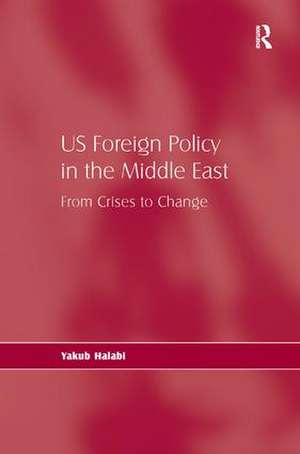US Foreign Policy in the Middle East: From Crises to Change
Autor Yakub Halabien Limba Engleză Hardback – 28 feb 2009
Preț: 764.20 lei
Preț vechi: 1027.40 lei
-26% Nou
Puncte Express: 1146
Preț estimativ în valută:
146.30€ • 150.46$ • 121.37£
146.30€ • 150.46$ • 121.37£
Comandă specială
Livrare economică 27 ianuarie-10 februarie
Doresc să fiu notificat când acest titlu va fi disponibil:
Se trimite...
Preluare comenzi: 021 569.72.76
Specificații
ISBN-13: 9780754675242
ISBN-10: 0754675246
Pagini: 170
Dimensiuni: 156 x 234 mm
Greutate: 0.45 kg
Ediția:1
Editura: Taylor & Francis
Colecția Routledge
Locul publicării:Oxford, United Kingdom
ISBN-10: 0754675246
Pagini: 170
Dimensiuni: 156 x 234 mm
Greutate: 0.45 kg
Ediția:1
Editura: Taylor & Francis
Colecția Routledge
Locul publicării:Oxford, United Kingdom
Notă biografică
Yakub Halabi is Adjunct Lecturer, Queen's University, Kingston, Ontario, Canada and Lecturer, West Galilee College, Acko, Israel.
Recenzii
'Halabi provides an excellent overview of US foreign policy in the Middle East in the past three and half decades which he subdivides in five phases. His analysis of how US decision makers understand change and how they cope with the post crisis reality is most interesting. Halabi does not overlook structures, but he prefers to focus on the role of ideas in politics. This is a useful introduction to US foreign policy in the Middle East that ends with a provoking and timely chapter on the US promotion of democratization of this crisis-ridden region of the international system. This venture is charged with the lack of proper knowledge about realities on the ground by US decision makers.' Bassam Tibi, Cornell University, USA '...provides a comprehensive and thorough overview of US policy toward the Middle East. The author presents the complex history of US involvement in the region in an approachable manner that ties together the goals and objectives of successive administrations within the broader context of global and regional events. Most significantly, the author links the expansion of US global interests with the increasing attention focused on the Middle East and explores the relationship between the region and the broader patterns of US foreign and security policy.' Tom Lansford, University of Southern Mississippi, USA 'Yakub Halabi has written a thoughtful interpretation of the evolution of American policy in the Middle East. He highlights the role of ideas, especially as they emerge during crises that reveal the failure of old ideas. This is a particularly timely book as American political elites are re-assessing the existing notions of the national interests, including those that pertain to the Middle East.' Shibley Telhami, University of Maryland and Brookings Institution, USA
Cuprins
Chapter 1 Introduction; Chapter 2 Ideas Matter; Chapter 3 Consolidation and Learning by Doing: US Foreign Policy in the Middle East 1945–1973; Chapter 4 The Oil Embargo Crisis in 1973–1974; Chapter 5 The Iranian Revolution and US Foreign Policy in the Middle East Between 1979-2001; Chapter 6 September 11 and the War on Terror: The Rise of Neo-Conservativism; Chapter 7 Back to the Future: The Second Iraq War and the United States Democratization Policy in the Middle East; Chapter 8 Conclusion;
Descriere
US foreign policy in the Middle East has for the most part been shaped by the eruption of major crises. Yakub Halabi analyzes the way ideas and conceptions have guided US foreign policy in the Middle East, the erection of institutions through which these ideas were brought into practice, and the manner in which these ideas became obsolete and were modified by new ideas.
